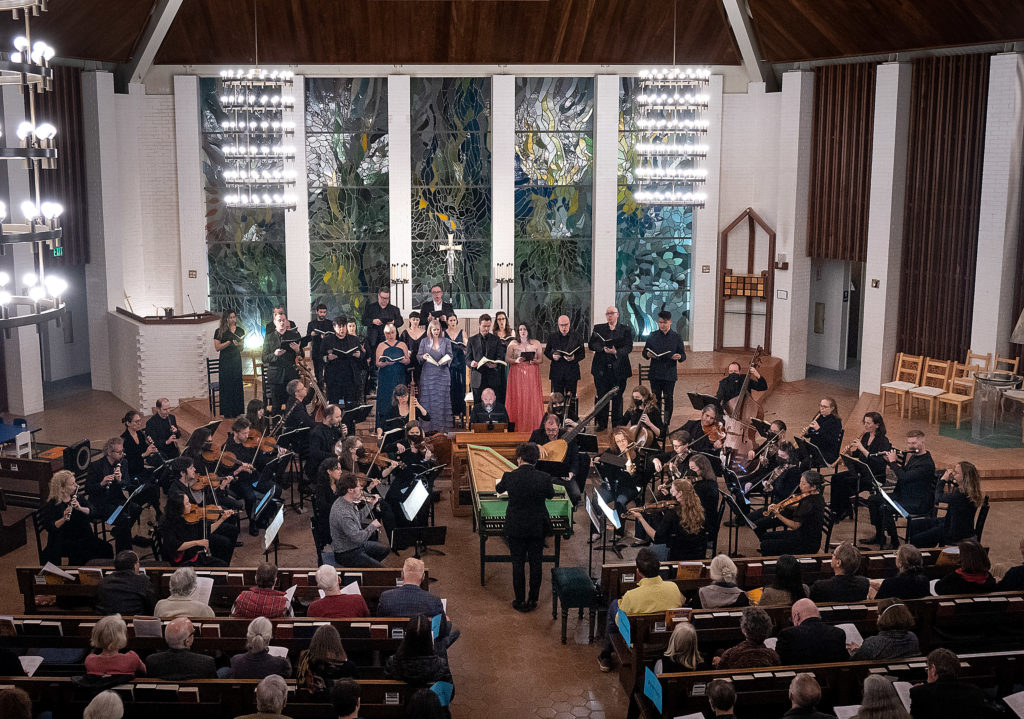Bach Collegium San Diego’s Powerful, Inspiring Bach ‘St. Matthew Passion’
Some twenty years ago Ruben Valenzuela corralled his musician friends to perform J. S. Bach’s St. John Passion. Since that concert turned out to be the beginning of the Bach Collegium San Diego, it seemed appropriate to crown the company’s two decades of exemplary period music performance with Bach’s St. Matthew Passion.
According to Bach’s obituary, he composed five different settings of the various passion accounts found in the Gospels, but the only settings that have survived are those of St. John and St. Matthew. Bach’s sons were not particularly faithful custodians of the manuscripts he left them!First performed on Good Friday, 1729, the St. Matthew Passion is structurally grander than the earlier 1724 St. John Passion, and in Bach’s later work we see the composer’s deep faith expressed in more tender, personal terms, especially in the reflective arias. Music historians rank this St. Matthew Passion along with Beethoven’s Missa Solemnis and Verdi’s Requiem as the apogee of sacred music in Western Music.
The Bach Collegium’s commanding St. Matthew Passion performance proved worthy of the work’s high esteem in the canon: powerful choruses supported by Valenzuela’s dependably vibrant period instrumentalists; from the vocalists, gorgeous, probing arias adorned with shimmering instrumental obbligatos, and overall, that unerring, driving pulse that can sustain the Passion’s three hours of sacred drama.
In the role of the Evangelist, the passion story’s omnipresent narrator, tenor Aaron Sheehan’s supple traversal of recitative and impeccable declamation never failed to engage the listener. His arias, such as “Geduld, Geduld” with rustling cello obbligatos beneath him, were equally rewarding. Eloquent bass baritone Paul Max Tipton presented a strong but compassionate Christus, especially in the scene where he shares the last meal with his disciples.
In the contrasting roles of Judas and Pontius Pilate, Enrico Lagasca used his robust bass timbre to convincingly convey the cunning of Judas and the authority of Pilate, and his vibrant declamation underscored the impassioned pleas of his aria “Gebt mir meinen Jesu wieder!”
Soprano Clara Rottsolk brought tender, graceful phrasing to the most celebrated aria of the Passion, “Aus Liebe will mein Heiland sterben,” and the strength of her upper range floated her line above the orchestra. In a recitative filled with pious introspection—which is an important spiritual goal of a Passion presentation—soprano Estilí Gomez imbued “Wiewohl mein Herz in Tränen schwimmt” with heartfelt emotion, followed by exuberant joy in her aria “Ich will dir mein Herze schenken.”
Countertenor Jay Carter has been a frequent guest soloist with the Bach Collegium over the years, but I have never heard him give a more riveting interpretation of an aria than his ardent “Erbarme dich, mein Gott,” coupled with an equally persuasive violin obbligato by concertmaster Marty Davids. Mezzo-soprano Virginia Warnken Kelsey brought laudable interpretive insight and skill to her arias, although her voice did not carry as well in the All Souls’ Episcopal Church sanctuary as did those of her colleagues.
Under Valenzuela’s unswerving direction, those great ensemble pillars of the Passion—the billowing chorale fantasias that open and close the first half—engaged the sixty plus Bach Collegium musicians in thrilling ensemble collaboration. For these two movements, an additional treble choir made up of voices from the San Diego Children’s Choir, the Our Lady of Peace Choir, and the All Souls’ Episcopal Church Choristers added to the bold texture. This rich, sonorous ensemble, however, may have been too much for the modest size the suburban All Souls’ sanctuary. I would love to have experienced this work in, say, St. Paul’s Episcopal Cathedral in Bankers Hill, where the sound could have rolled out under its high arches.
The Passion’s reflective chorales cultivate the listeners’ emotional response to the drama, and the Bach Collegium chorus—usually accompanied by the instruments but sometimes a cappella—gave the chorales both conviction and requisite gravitas. Some of Valenzuela’s chorale tempos were a bit brisk for my Lutheran ears, but the musicological debate on the historical tempo of chorale singing has never been clearly resolved.
For those who keep the season of Lent, this performance provided a nonpareil experience of deep reflection. For those who experience the St. Matthew Passion as one of the great musical achievements of Western musical culture, the experience was equally rewarding. There is something about the music of Bach well presented that transcends the individual and puts all in touch with their highest aspirations. Could we ask for more?
The Bach Collegium San Diego presented in concert J. S. Bach’s ‘St. Matthew Passion’ on March 24 & 25, 2023. I heard the March 24 performance at All Souls’ Episcopal Church in Point Loma. The concert was repeated on March 25 in Cardiff.

Ken Herman, a classically trained pianist and organist, has covered music for the San Diego Union, the Los Angeles Times’ San Diego Edition, and for sandiego.com. He has won numerous awards, including first place for Live Performance and Opera Reviews in the 2017, the 2018, and the 2019 Excellence in Journalism Awards competition held by the San Diego Press Club. A Chicago native, he came to San Diego to pursue a graduate degree and stayed.Read more…


Is there a st. Matthew Passion performance in 2024